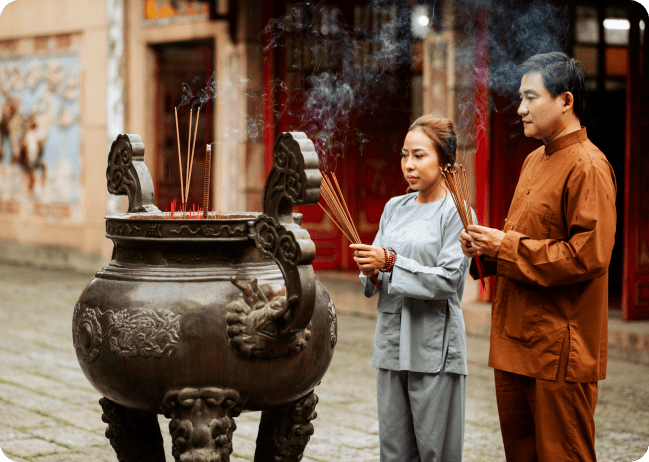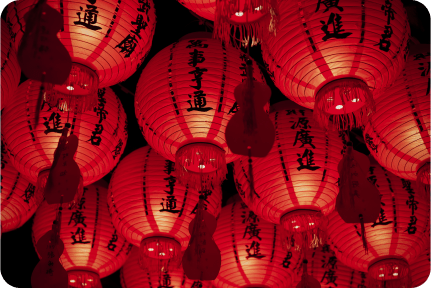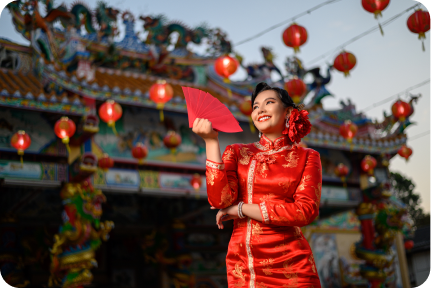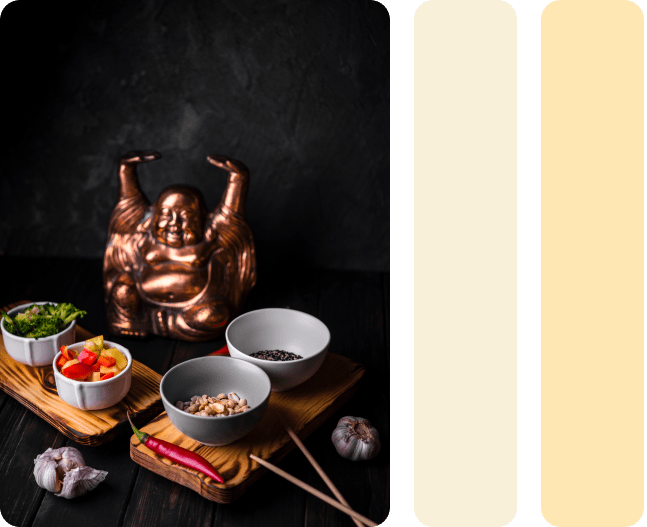Cherish and enrich ancestors and past loved ones
Qingming Festival 清明节
The Qingming Festival 清明节, also known as Tomb-Sweeping Day, is a traditional Chinese festival celebrated for over 2,500 years. In the Chinese lunar calendar, the Qingming Festival falls on the 15th day after the Spring Equinox. This usually corresponds to April 4th or 5th in the Gregorian calendar.
It is celebrated across mainland China, Hong Kong, Macau, and Taiwan, as well as many other Asian regions including Malaysia, Singapore, Cambodia, Indonesia, Philippines, Thailand, and Vietnam.

HISTORY
The History of Qingming Holiday
The Qingming Festival is a time to cherish and honor ancestors and passed loved ones. The festival is marked by the burning of Joss paper, also known as “Spirit or Ghost money.” This is used as an offering from the living to the spirit realm, providing wealth and comfort to ancestors in the afterlife. Millions of people around the world celebrate the Qingming Festival, particularly in China and Southeast Asia. The festival is based on thousands of years of Chinese culture and spirituality, serving as a bridge between the living and the dead. It harmonizes the worlds of the present and the past.
The origins of the Qingming Festival trace back to the Zhou Dynasty (1046-256 BC) when the ruling class observed rituals to honour their ancestors. Over centuries, the tradition evolved, incorporating elements of spring celebrations and ancestor worship.
The festival’s name, Qingming, translates to “clear and bright,” symbolising the clarity and renewal that the spring season brings, reflecting the deep-seated belief in the cyclical nature of life and death.

ABOUT THE FESTIVAL
What is the Holiday About
At the heart of the Qingming Festival lies the practice of tomb sweeping. Families visit the graves of their ancestors to clean the tombstones. They offer food and other items from the material world by burning joss paper and incense. This act symbolizes the living’s respect and remembrance of their forebears. The festival is not just about maintaining the physical grave sites but also about maintaining the spiritual connection with those who have passed.
Joss paper, often referred to as spirit or ghost money, plays a pivotal role in the Qingming Festival. Joss paper comes in the form of currency, food, clothing, cars, and even houses and luxury items. These offerings are burned for the deceased in the belief that they can be used by spirits in the afterlife. This provides the spirits with comfort and wealth. Burning joss paper is a sacred ritual believed to transfer material wealth from the physical world to the spirit realm. This ensures that ancestors live in comfort and abundance.
The practice of burning joss paper is deeply symbolic. It represents the continuity of life and the ongoing relationship between the living and the dead. It’s not just about wealth but also care and consideration. The smoke from the burning joss paper is thought to carry prayers and messages to the ancestors. This reinforces the bonds of familial love and respect. Spirits, according to tradition, are aware of the Qingming Festival and eagerly anticipate offerings from their descendants.
The Spiritual Significance of Qingming Festival
Ancestors are believed to gather around their grave sites, invisibly witnessing the rituals performed in their honour. Although no longer part of the physical world, ancestors are thought to play an active role in the lives of the living. They provide guidance, blessings, and protection. The Qingming Festival is also a time for family reunions, bringing together generations and creating a sense of continuity.
While the older generation passes down stories and traditions, the younger generation learns to honour and respect their roots. The Qingming Festival is not just about honouring the past; it also creates a sense of belonging and identity in the present. In the spiritual realm, ancestors view the Qingming Festival as a testament to their enduring legacy. They take solace in being remembered and revered, with their stories and achievements forming a crucial part of the family’s history. The offerings made, particularly the burning of joss paper, are seen as a manifestation of love and respect, providing comfort in the afterlife. As the sun sets on the Qingming Festival, the boundaries between the living and the dead blur.
The air is thick with the scent of burning joss paper, and the spirits of ancestors linger. Their presence is felt in the gentle rustling of the leaves and the flickering of candlelight. It is a moment of profound connection, where time and space dissolve. The eternal dance of life and death is celebrated in all its esoteric, spiritual glory.
SIMILAR FESTIVALS
Similar Festivals
1.Chinese New Year (During this celebration, families set up altars with offerings to invite the spirits of their ancestors to join the festivities.
2. Zhong Yuan Festival: Also known as the Hungry Ghost Festival involves making offerings to appease the spirits of the deceased who are believed to visit the living.
3. Obon Festival: Primarily in Japan where families clean graves, offer food, and light lanterns to guide the spirits of their ancestors.
4. Chuseok: Also known as Korean Thanksgiving Day, this festival involves family reunions, giving thanks for the harvest, and paying respects to ancestors.
5. Pchum Ben: A 15-day festival where Cambodians make offerings to their ancestors and the deceased to ensure their spirits are at peace.
6. Hungry Ghost Festival: Similar to the Ghost Festival in China, this Vietnamese festival involves offering food and burning joss paper to appease wandering spirits.



SINGAPOREAN FESTIVAL
Zhong Yuan Jie Festival
In Singapore, the seventh-month festival, or Zhong Yuan Jie 中元节, is observed throughout the entire seventh lunar month. This period usually falls around August in the Western calendar. Zhong Yuan Jie (中元节) is an old Chinese belief or tradition. It is mostly observed by Chinese Buddhists and Taoists who believe that during this time, the gates of Hell are opened. This release allows spirits to roam the earth, creating the “seventh month” or 七月 (“seventh month” in Chinese).
In the lunar calendar, the 7th month is called Tishri — it was formally known as Ethanim. According to the book of Leviticus chapter 23:23–25, a new year is celebrated on the 1st of Tishri. More so, the 10th of the 7th month marked the day of atonement.
Similar to the Qingming Festival, the practice of burning joss paper is deeply symbolic. The burning of joss paper crafted as money, houses, cars, phones, and even luxury goods like a Rolex is believed to offer comfort to ancestors in the afterlife. It represents the continuity of life and the ongoing relationship between the living and the dead. It’s not just about wealth but also care and consideration. The smoke from burning joss paper is thought to carry prayers and messages to ancestors. This reinforces the bonds of spirits, according to familial love and respect. Ancestors, while no longer part of the physical world, are thought to play an active role in the lives of the living. They provide guidance, blessings, and protection.

